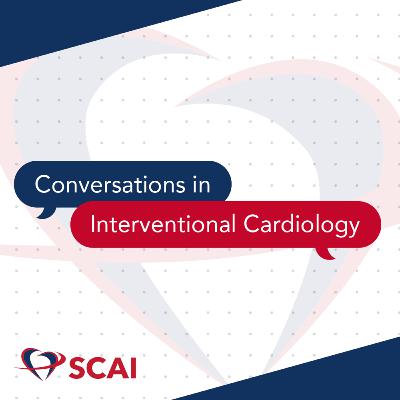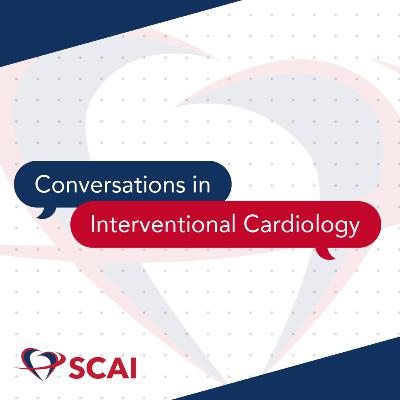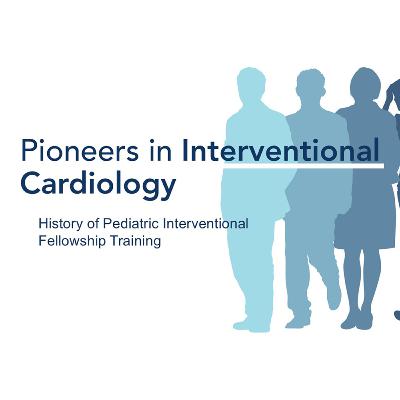Discover JSCAI BEATS
JSCAI BEATS

JSCAI BEATS
Author: The Journal of the Society for Cardiovascular Angiography & Interventions
Subscribed: 3Played: 13Subscribe
Share
© The Journal of the Society for Cardiovascular Angiography & Interventions
Description
Interventional Cardiology experts explore the latest breakthroughs, insights, and exclusive interviews from The Journal of the Society for Cardiovascular Angiography and Interventions (JSCAI), SCAI's official journal. Stay connected with your on-the-go journal resource for the latest cutting-edge developments, innovations, and research.
116 Episodes
Reverse
SCAI experts Drs. Lyndon Box, Frank Ing, Dennis Kim, and Holly Bauser-Heaton discuss a new original research article outlining the economic challenges impacting access to interventional cardiology care for adults and children with congenital heart disease. They discuss SCAI’s policy recommendations and explore practical solutions to improve equity and affordability. Watch to learn about the challenges patients face, the impact on access to care, and the policy recommendations aimed at driving meaningful change. Read the full JSCAI article here: https://www.jscai.org/article/S2772-9303(25)01315-8/fulltext
Drs. Dean Kereiakes, Robert Riley, Nadia Sutton, and Amit Vora discuss the findings from the study “Comparative Effectiveness of 2 Next-Generation Scatter Radiation Shielding Systems,” which evaluates performance and safety improvements in modern shielding technologies. Learn how these innovations aim to reduce radiation exposure and enhance protection in clinical environments.Read the full article here: https://www.jscai.org/article/S2772-9303(25)01228-1/fulltext
SCAI experts Drs. Cindy Grines, David Kandzari, Annapoorna Kini, and Mohammad Alqarqaz discuss findings from this original research study. Watch to hear about the clinical experience and outcomes from "The Ringer Study," which evaluates a novel perfusion balloon catheter in coronary artery perforation (CAP) cases. Learn how this innovative device may impact procedural safety and patient care in interventional cardiology.Read the full article here: https://www.jscai.org/article/S2772-9303(25)01017-8/fulltext
Andrew Goldsweig, MD, MSc, FSCAI, Amit Vora, MD, MPH, FSCAI, Sunil Rao, MD, MSCAI, Michele D. Voeltz, MD, highlight key findings from the paper on "Variability in State-Level Regulations Regarding Occupational Radiation Exposure." The discussion emphasized the wide variability in state requirements for shielding, dose monitoring, and safety training, despite uniform federal exposure limits. The panelists underscore the need for a centralized, accessible resource to guide institutions in improving radiation protection practices and reducing occupational risk.Read the article in JSCAI: https://www.jscai.org/article/S2772-9303(25)01039-7/fulltext
In this video interview, Daniel Chamié, Federico Oliveri, and Ziad Ali discuss key findings from the JSCAI article highlighting how intravascular lithotripsy improves coronary artery compliance and predicts stent expansion in heavily calcified lesions.Read the article: https://doi.org/10.1016/j.jscai.2025.102635
Sahil Parikh, Hassan Saleh, Peter Monteleone, and Kenneth Rosenfield discuss new data on the use of mechanical thrombectomy for pulmonary embolism. The discussion highlights how these findings may shape patient selection and treatment strategies in managing PE.Read the article in JSCAI: https://doi.org/10.1016/j.jscai.2025.102611
Drs. Daniel Chamié, Yiannis Chatzizisis, Natalia Pinilla-Echeverri, Thomas Johnson, and Evan Shlofmitz discuss the role of HD IVUS and OCT in complex coronary interventions, highlighting key differences between the two technologies and how these insights can guide imaging strategies and enhance clinical decision-making.Read the article in JSCAI: https://www.jscai.org/article/S2772-9303(24)02209-9/fulltext
In this video, the authors of the study discuss the cost-effectiveness of ultrasound renal denervation (uRDN) for resistant hypertension in the United States. They explore how uRDN, when added to standard care, improves quality-adjusted life years and reduces cardiovascular risks at a favorable cost per QALY.SCAI Experts, Drs. Suzanne Baron, Rod Taylor, and Ajay Kirtane discuss the highlights from this original research article. Read the JSCAI article here: https://www.jscai.org/article/S2772-9303(25)01043-9/fulltext
This interview with Drs Sandeep Nathan, Suzanne Baron, Mir B. Basir, Mirvat Alasnag highlight the consensus statement addressing sex-based disparities in cardiogenic shock care. Experts discuss the current state of treatment for women, gaps in evidence, and priorities for improving outcomes, offering practical insights and guidance for practice. Read the article published in JSCAI: https://www.jscai.org/article/S2772-9303(24)01373-5/fulltext
This conversation explores a nationwide Swedish study comparing Absorb bioresorbable scaffolds to drug-eluting stents in over 1,900 patients. While early complications were higher with scaffolds, long-term results suggest potential benefits including lower heart attack rates after three years.SCAI Experts, Drs. Dean Kereiakes, Saman Saidi-Seresht, Patrick Serruys, and Gregg Stone discuss the highlights from this original research article. Read the JSCAI article: https://doi.org/10.1016/j.jscai.2025.103724
The global Optimize PRO study shows that using a standardized TAVR care pathway and cusp overlap technique with Evolut PRO/PRO+ valves led to low pacemaker rates, no moderate/severe aortic regurgitation, and favorable 30-day outcomes. SCAI Experts, Drs. Suzanne Baron, Steven Yakubov, John Forrest, and Mayra Guerrero discuss the highlights from this original research article. Read the JSCAI article: https://doi.org/10.1016/j.jscai.2025.103515
Drs. Sahil Parikh, Robert Attaran, Pamela Kim, and Jeff Carr discuss the newly released SCAI guidelines on chronic venous disease (CVD), highlighting key takeaways from the comprehensive review. They discuss the clinical rationale behind the evidence-based recommendations, including guidance on compression therapy, vein ablation, and revascularization strategies. The panel also explores the decision-making algorithms developed to streamline treatment and areas where further research is urgently needed.Read the JSCAI article: https://doi.org/10.1016/j.jscai.2025.103729
Yiannis Chatzizisis, Guest Editor of JSCAI's Special Issue on The Role of AI in Cardiovascular Interventions, moderates this interview exploring the intersection of interventional cardiology (IC) training, education, and artificial intelligence. The discussion centers around three featured papers from the special issue, authored by Drs. Saurav Chatterjee, Saumya Nanda, Amanda DeVos, and Trevor Simard, each highlighting innovative applications of AI in the education and training of cardiovascular specialists:1- Evaluating AI's Ability to Address Nuanced Cardiology Subspecialty Questions: ChatGPT and CathSAPhttps://doi.org/10.1016/j.jscai.2025.1025632- Development of an Educational Application of Multi-modal Imaging of Clinically Implanted and Bifurcation Stenting Procedureshttps://doi.org/10.1016/j.jscai.2024.1024993- Virtual Reality Simulation with Integrated Passive Haptics Prototype for Cardiac Catheterization Laboratory Traininghttps://doi.org/10.1016/j.jscai.2024.102451
Experts, Sahil Parikh, Abdullah Shaikh, Steven Abramowitz, and Hillary Johnston-Cox discuss this study published in JSCAI, highlighting its contribution to the evolving management of venous in-stent thrombosis. This multicenter retrospective analysis evaluated the safety and feasibility of the RevCore thrombectomy catheter, demonstrating technical success with no device-related serious adverse events and 94% patency at first follow-up.Read the article in JSCAI: https://doi.org/10.1016/j.jscai.2025.102571
Beginning in the late 1970s and early 1980s, the origins of congenital heart disease (CHD) interventional fellowship training can be traced to five seminal pioneers: Charles Mullins, James Lock, William E. Hellenbrand, Lee N. Benson, and Albert P. Rocchini. The vast majority of CHD interventional cardiologists with formal training can trace their learning lineage back to this group. In the video, listen to William E. Hellenbrand, MD, MSCAI; Lee N. Benson, MD, MSCAI; Albert P. Rocchini, MD; and Frank F. Ing, MD, MSCAI, as they discuss how each of their programs began. The accompanying article in JSCAI features tributes to each of the five pioneers, written by their former fellows. Read the article in JSCAI: https://doi.org/10.1016/j.jscai.2025.103707
Sandeep Nathan, MD, MSc, FACC, FSCAI, Matthew Sherwood, MD, FSCAI, Kendra Grubb, MD, Adam Greenbaum, MD, FSCAI discuss the SCAI Expert Consensus Statement published in JSCAI. The panel provides an insightful overview of the expert consensus, highlighting that alternative access is essential for a small subset of TAVR patients. It emphasizes the most effective techniques, the importance of a collaborative, multidisciplinary approach in patient selection, and the need to recognize institutional resources and operator capabilities for optimal patient outcomes. Additionally, the panel explores how cutting-edge advancements in device technology and imaging are revolutionizing the safety and precision of alternative access TAVR procedures, enhancing both patient care and procedural success.Read the article: https://doi.org/10.1016/j.jscai.2024.102514
In two landmark articles published in the JSCAI, leading experts Elazer R. Edelman, MD, PhD, Michael Taylor, MD, PhD, Brian Quinn, MD, and Kathy Jenkins, MD, MPH discuss the transformative potential of artificial intelligence (AI) in pediatric and congenital cardiac care. Read the related articles:The Role of AI in CHD and Interventions: https://doi.org/10.1016/j.jscai.2025.102567 Generating Risk Reduction Analytics in Complex Cardiac Care Environments: https://doi.org/10.1016/j.jscai.2024.102434
Yiannis Chatzizisis, MD, PhD, FSCAI, Zain Khalpey, MD, PhD, FACS, Robert Herman, and Karley B. Fischer, MD discuss 4 articles published in JSCAIs special issue on "The Role of Artificial Intelligence in Cardiovascular Interventions". Watch the video conversation on AI and Coronary procedural planning and read the related articles below: Enhancing Diagnostic Accuracy and Procedural Outcomes in Interventional Cardiology Through Machine Learning Algorithms: https://doi.org/10.1016/j.jscai.2024.102511 AI in Coronary Artery Interventions: Preprocedural Planning and Procedural Assistance: https://doi.org/10.1016/j.jscai.2024.102519 Artificial Intelligence-Powered Electrocardiogram Detecting Culprit Vessel Blood Flow Abnormality: AI-ECG TIMI Study Design and Rationale: https://doi.org/10.1016/j.jscai.2024.102494 Effects of Artificial Intelligence Clinical Decision Support Tools on Complications Following Percutaneous Coronary Intervention: https://doi.org/10.1016/j.jscai.2024.102497
Jonathon Leipsic, Yader Sandoval, Koen Nieman, Natalia Pinilla, and Hector Garcia discussed the significance & highlights from the CCTA roundtable document. The panel emphasized the use of CCTA to enhance pre-procedural planning, improve patient outcomes, and optimize resource utilization by providing detailed anatomical and functional assessments of coronary lesions. The experts also highlighted the roundtable's recommendations, which included increasing access to contemporary CCTA scanners, enhancing visualization tools for interventionalists, and promoting educational training efforts. Read the article: https://doi.org/10.1016/j.jscai.2025.103664
Elazar Edelman, MD, PhD, Rohan Khera MD, MS, Afnan Tariq, MD, JD, FSCAI, & Curtis Rooney discuss 2 articles published in JSCAI's latest issue. This video interview focuses on its role in optimizing patient care, preserving physician autonomy, and addressing algorithmic bias. The panel also dives into the ethical, regulatory, and practical considerations of AI integration, highlighting the importance of societies in advocating for education and promoting transparent, equitable, and secure AI-driven decision-making systems.1- Harnessing Artificial Intelligence for Innovation in Interventional Cardiovascular Care: https://doi.org/10.1016/j.jscai.2025.102562 2- Governing the Unbound: SCAI’s Role in the Future of Artificial Intelligence: https://doi.org/10.1016/j.jscai.2024.102517Read the special issue:








